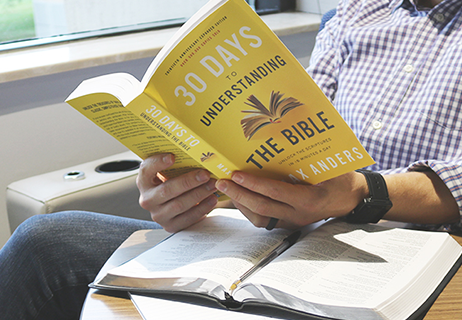Several years ago, I found myself experiencing a struggle I had never dealt with before. I was a lifelong Christian, growing in my faith, and following God’s call into ministry. I was writing and speaking and teaching women about the Bible, and from the outside everything looked easy and great.
Except that it wasn’t.
On the inside, I had become increasingly fragile and insecure. I wasted loads of mental energy on comparing, striving, and clamoring for affirmation. I needed to be seen, I needed to succeed, and I needed to be the best. And as a result, it stole the joy right out of my life, even the joy of my calling.
My Journey
Once I diagnosed the problem, I set about the work of fixing it. Like many Christian women, I devoured books on insecurity, I read blog posts and articles, listened to sermons and podcasts, and I meditated on my identity in Christ. And I searched the Bible for truth about myself.
But, at the end of it all, I realized something:
None of it helped.
All of those messages, and all of that truth, had barely even scratched the surface. It’s not that I struggled to believe God’s promises—that I am loved, rescued, and delighted in—because I believed them whole-heartedly. Instead, something else was going on underneath my insecurity, and I was determined to find out.
What Does the Bible Say?
Once I realized that the traditional approaches to insecurity were not helping me, I decided to reapproach the problem in a different way. Instead of asking what the Bible says about me, I decided to ask a different question: When people in the Bible brought their insecurities to God, what did God actually say to them?
The answer to this was not at all what I expected.
Even Moses Was Insecure
Take Moses, for example. God called Moses to speak to Pharoah on His behalf, and Moses thought this was a terrible idea. He was not eloquent. Speaking never came easily to him. He wondered if God should reconsider.
In response, God did not coddle Moses. He didn’t encourage him or comfort him one bit. Instead, this is what He said:
“Who gave a mouth to man, or who makes a person mute or deaf or seeing or blind? Is it not I, the Lord?” – Exodus 4:11
Author Jen Wilkin describes this exchange as God “changing the subject,” off of Moses’ inability, and onto God’s ability.
And this was the lightbulb moment I had been waiting for.
The Two Causes of Insecurity
What I have since discovered is that there are two root causes of insecurity. The first is one we talk about all the time: low self-esteem. Low self-esteem is the inability to see ourselves as God sees us. It is deeply painful, and God has an answer for it: His truth. When we struggle with degrading lies about who we are, we can seek refuge in God’s Word, remembering His beautiful love for us. We can also surround ourselves with truth speakers who can declare God’s love over our hearts, especially on those days when we are unable to believe it ourselves.
However, there is a second cause of insecurity that we almost never talk about, which is self-preoccupation. As we see in the story of Moses, self-preoccupation places you at the center of everything, which means everything hinges on you, and everything is ABOUT you. Your parenting, your job, that woman who looked at you funny at the grocery—it’s all a referendum on your value and your worth. And as a result, the stakes become impossibly high.
The Solution
But here is the thing about self-preoccupation: it requires a different solution. If you respond to self-focus with heaps of affirmation—even biblical affirmation—it only reinforces the problem. Even when your self-focus is positive and godly, your vision is still locked on something inherently insecure—yourself—instead of fixing your gaze on the rock of Christ.
That was my problem. My self-esteem wasn’t perfect, but that wasn’t really the problem. The problem was that my focus was off. I wasn’t enjoying the freedom and confidence of living for Christ, because I wasn’t living for Christ. I was living for me. My eyes were fixed on me. My marriage, my parenting, my appearance—even my faith—had slowly turned inward, and I had become the center of it all.
I think it’s time to name this brokenness in our culture and in ourselves. For many of us, the cause of our insecurity isn’t simply low self-esteem, but a misplaced focus on self. We have forgotten the center of the gospel, which has taken all the power out of it. Our faith has grown small and weak because it isn’t about God, but us.
The answer, then, is not simply remembering who we are in Christ, but also remembering that we are not the center of the story. Everything in our lives—everything that we have, that we are, and that we are called to—is all meant to point away from us and toward the glory of God. And once we get this, and live it, it’s freedom.







4 replies on “The Secret Reason for Your Insecurity”
Thanks for sharing it’s inspiring
This has come at the right time….I am in fear my children may be inconvenienced by my transfer…. please pray for me….I know the power of God
Thanks for sharing with me! It’s very nice encouragement to me in the ministry. however, in most case I have seen people talking about their problems but thank God this message has come at the right time.
Great reminder at a much needed time!